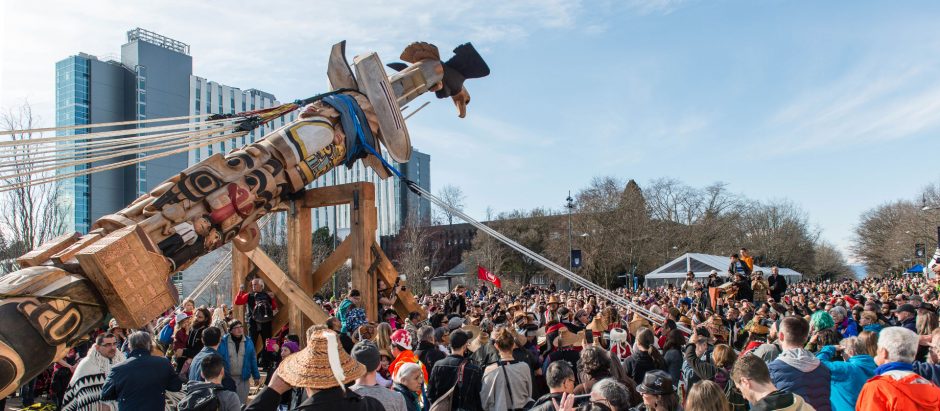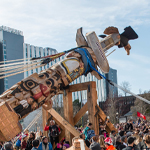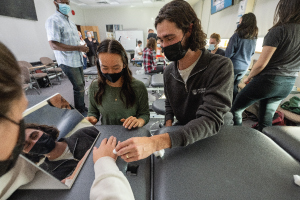Helping to improve the health and wellness of Indigenous populations and communities is a crucial priority for the UBC Department of Physical Therapy.
The department is committed to increasing the number and retention of Indigenous physical therapists in British Columbia, as well as increasing the number of physical therapists who practice cultural safety and humility. The Master of Physical Therapy program is working towards improving physical therapy capacity in underserved areas, including Indigenous communities. Our faculty, staff and learners are helping to build a healthcare system that is more inclusive, respectful, and equitable.
Responding to the Indigenous Strategic Plan (ISP)
The Department participated in the UBC Indigenous Strategic Plan (ISP) Self-Assessment Tool which was provided as part of the UBC ISP. This tool allows units to reflect and discuss their role at UBC within the context of Indigenous engagement. The Self-Assessment process was completed in 2022 and helped to situate the Department of Physical Therapy with ISP goals and actions.
Strategic Plan Objectives
The Department of Physical Therapy’s 2021 Strategic Plan highlights the Department’s commitment to actively align with the UBC Indigenous Strategic Plan (ISP, 2020) and recognizes the department, Faculty of Medicine, and UBC’s commitments to responding to the Calls for Action stated in the Truth and Reconciliation (TRC).


View the department objectives related to Indigenous Initiatives:
Overall Objective:
To improve physical therapy capacity in underserved areas, including Indigenous communities, and in specialty areas of practice – 2021 Strategic Plan
OBJECTIVES
Optimize admissions and recruitment strategies to admit students with an interest to serve in the public sector and under-served populations*.
*Under-served populations = include Indigenous, rural and newcomer students.
STRATEGY
- Recruit and admit students with an interest in serving the healthcare needs of all British Columbians, with a focus on applicants with an interest in public practice and under-served populations.
- Develop and expand recruitment strategies (mentorship and relationship building) for systematically marginalized communities including Indigenous, rural and newcomer students.
KEY PERFORMANCE INDICATORS
- An increase in the number of UBC graduates employed in rural & remote geographical areas and public practice settings.
- Maintain or increase the diversity of students to match the profile of the BC population.
OBJECTIVES
Ensure MPT curriculum meets the needs of all British Columbians, in particular under-resourced communities.
STRATEGY
- Engage with stakeholders to develop new content to better prepare graduates to work with patients from diverse areas and with complex needs in line with a justice, equity, diversity and inclusion (JEDI) lens.
- Incorporate Indigenous health and traditional well-being concepts, anti-racism, anti-oppression and justice, equity, diversity, decolonization and inclusion content across the curriculum.
- Provide capacity development opportunities for all staff and faculty in both:
a) JEDI & cultural intelligence AND
b) Indigenous Cultural Humility to strengthen capacity to provide inclusive services.
OBJECTIVES
- Support clinical educators working in under-resourced areas and optimize learning opportunities for them.
- Educate students who graduate and serve the physical therapy health needs of all BC’s communities.
STRATEGY
- Support clinical educators working in under-resourced areas to become clinical faculty and contribute to instructional capacity, including/focusing on Indigenous faculty and educators from diverse backgrounds.
- Optimize learning opportunities that expand learners’ experiences to underserved areas.
- Ensure that all students experience clinical examples during lectures/labs that address underserved geographical areas as well as populations/ communities that expand beyond the urban setting.
- Expand clinical experiences in diverse areas, including rural contexts.
- Expand the distribution of the MPT program to sites in Fraser, the Okanagan, and the Island.
KEY PERFORMANCE INDICATORS
- Increase opportunities for clinical faculty members from under-served areas to contribute to MPT teaching by >2 per year.
- Increase positive feedback from students regarding the diversity of the learning environment and experience.
OBJECTIVES
- Engage in partnerships with Indigenous Peoples and communities to further research in rehabilitation as identified through the partnership.
- Based on the partnerships with Indigenous Peoples and communities, highlight faculty who are doing research projects in Indigenous Health or underserved areas.
STRATEGY
- Develop partnerships with key stakeholders to better understand PT-related research needs for their communities.
- Hold one slot of DPT Research Rounds per year for the presentation of research projects in Indigenous Health or underserved areas.
KEY PERFORMANCE INDICATORS
- A number of projects involved Indigenous Partners where DPT faculty is PI, Co-I or collaborator.
- A number of media citations for work by a faculty member in this area (i.e., feature on Department, FOM or UBC web or print media, as well as those of Research Institutes, as well as traditional media, namely radio, TV, newspaper, social media and web.
Justice, Equity, Diversity, and Inclusion Position Statement
On behalf of the physiotherapy profession in British Columbia, the Department of Physical Therapy at the University of British Columbia, the College of Physical Therapists of British Columbia, and the Physiotherapy Association of British Columbia are committed to supporting social justice, equity, diversity, and inclusion, to opposing and taking action to address racism, oppression, and discrimination, in health, health care, within our organizations and the physiotherapy profession.
Stories
-

Makenzie McCallum
Congratulations to Makenzie McCallum, supervised by Dr Naznin Virji-Babul, for receiving the 2025 Canadian Association for Medical Education (CAME) Rising Star – Certificate of Excellence Award! This prestigious award recognizes outstanding contributions to research, particularly Makenzie’s work on concussion awareness among Indigenous ice hockey players. Makenzie McCallum Program: MSc Supervisor: Dr Naznin Virji-Babul Connect with…
-

Indigenous MPT student awarded Indigenous Graduate Fellowship
We are thrilled to announce Maddi Bulloch, an Indigenous student in the Master of Physical Therapy Program, is a recipient of the prestigious Indigenous Graduate Fellowship (IGF). The IGF, awarded based on academic merit, is part of an annual competition managed by the UBC Faculty of Graduate and Postdoctoral Studies. Tell us a bit about yourself and your…
-

September 2023 – Truth and Reconciliation Month
On September 30th, Canada will hold its 2nd National Truth and Reconciliation day also known as Orange Shirt Day. This day commemorates the missing and murdered children from residential schools and honours the healing journey of residential school survivors. What were the residential schools? This 6-minute video provides a short timeline of these institutions, including…
Land Acknowledgement
The UBC Department of Physical Therapy and our programs occupy the traditional, ancestral and unceded territories of Indigenous nations throughout British Columbia.
We respectfully acknowledge that:
- The Vancouver cohort at the UBC Vancouver-Point Grey academic campus is located on the ancestral and unceded territory of the hən̓q̓əmin̓əm̓ speaking xʷməθkʷəy̓əm (Musqueam) people.
- The Northern cohort at the University of Northern BC Prince George campus is located on the traditional territory of the Lheidli T’enneh (Klate-lee Ten-eh), who are part of the Dakelh (Carrier) First Nations.
- The Fraser Valley cohort is located on the traditional territory of the QayQayt First Nation, Kwantlen, q̓íc̓əy̓ (Katzie), Semiahmoo, Tsawwassen First Nations, kʷikʷəƛ̓əm (Kwikwetlem), and Stó:lō Nations.
- The Victoria cohort at the University of Victoria campus is located on the traditional territory of the Lək̓ʷəŋən (Songhees and Esquimalt) and W̱SÁNEĆ Peoples.
Students gratefully complete their clinical placement requirements on Indigenous territories in Indigenous nations of Indigenous people throughout British Columbia.



